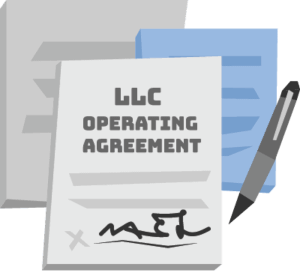How to Start an LLC in Kansas
Starting an LLC in Kansas only takes three steps:
- Name your business
- Select a Kansas resident agent
- File the $160 Kansas Articles of Organization form
Running a successful business goes beyond just these three steps, though. We go over everything that’s required to start your LLC in Kansas and what you need to do to maintain it.

1. Name Your LLC
If you want to start a Kansas LLC, you’ll first need to name your business. Kan. Stat. § 17-7920 outlines the rules of naming your LLC. Under the statute, the name must:
- Include the words Limited Liability Company or the abbreviations L.L.C. or LLC
- Not include words or abbreviations that suggest it’s another kind of entity, like Corp., Incorporated, or Limited Partnership
- Be unique among business names in Kansas
You can check your potential LLC name’s availability by using the Kansas Secretary of State’s business search portal.
It is free to use an available DBA in Kansas. A DBA (Doing Business As) name allows your business to use a name other than your legal LLC name. Unlike most states, Kansas does not require you to register your DBA, but if you plan to use a DBA, you’ll want to check its availability with the Kansas Business Filing Center.
Learn how to obtain a Kansas DBA.
Start Your Kansas LLC!


2. Register Your Domain Name
After choosing your LLC’s name, a good next step is locking down a domain name for your business website. Your domain name (URL) is the web address to your site.
A professional domain name should be easy to remember—and ideally, match or complement your business name. When you register your domain name early, you’re more likely to get a name that meets those standards.
You’ll need to claim a business domain name through a registrar. When you hire Northwest to form your LLC, domain registry is one of many in-house services we provide, so you also get a domain name free for a year, plus your own customizable business website secured with SSL protection, and up to ten email business addresses connected to that domain.

3. Designate a Resident Agent
All LLCs doing business in Kansas need a resident agent (also called a registered agent). Your resident agent is the person or entity designated to accept important legal mail on behalf of your business.
The requirements for a resident agent in Kansas are detailed in Kan. Stat. § 17-7925. At a minimum, your registered agent must:
- Be able to accept legal documents during regular business hours
- Have a physical, registered office address located within the state of Kansas (no P.O. Boxes)
- Notify the LLC members of any service of process
You’ll need to have your resident agent’s name and address ready before you fill out your Articles of Organization formation document.
Absolutely. The problem is, if you act as your own resident agent, your name and address will go on the public record, which can make it difficult to maintain privacy. What’s more, not all business owners can keep regular business hours. When you hire Northwest as your resident agent, you don’t have to worry about those things.
You can change your resident agent in Kansas anytime by filing a Change of Registered Office/Agent form online for $30.

4. Submit Kansas LLC Articles of Organization
Once filed with the Kansas Secretary of State, your Articles of Organization officially form your LLC. There is a base $160 filing fee, but the way you file your Articles may increase that fee.
To fill out the form, you’ll need to provide the following information about your LLC:
Your business name should include an indicator like LLC or Limited Liability Company.
List the name of the person or entity you’ve authorized to accept legal mail on behalf of your LLC.
Provide the Kansas street address where your resident agent will accept legal notifications.
List a Kansas street address where you want official state mail sent to your business. (other than the legal notices that will be sent to your resident agent). This cannot be a P.O. Box.
Choose the month your business has established as its tax closing or book closing period. December is the default
When do you want your LLC to start? You can delay its formation by 90 days, but most LLCs start as soon as their Articles are filed.
You’ll need an authorized person to sign, like an LLC member or your resident agent.
Note: All of the information on this form will become part of the public record.
Interested in forming a Series LLC or multiple LLCs within one LLC? Check out our Kansas Series LLC guide.
It costs $160 to file your Kansas LLC Articles of Organization online and get your business formed with the state. If you choose to file your Articles in person, it costs $165. Going the fax route is even more expensive at $185.
Filing your Articles of Organization online gets your Kansas LLC formed in minutes. Mail, in person, and fax filings may take up to several business days.
You can submit your Kansas Articles online, by mail, in person, or by fax.
Online:
Kansas Business Services Division
Mail and in person:
Secretary of State
Memorial Hall, 1st Floor
120 S.W. 10th Avenue
Topeka, KS 66612-1594
Fax:
(785) 296-4570
To amend your Kansas Articles, you need to file the Business Entity Certificate of Amendment. You’ll also need to pay a $35 filing fee.
To help keep your personal info off the public record, you should hire a professional registered agent to form your Kansas LLC. Any registered agent worth their salt will protect your personal information by listing their information in place of your own, wherever allowable, on your Articles of Organization.
How to Maintain Your Kansas LLC

5. Write an LLC Operating Agreement
Your Kansas LLC’s operating agreement is a document outlining how the internal workings of your LLC will be organized. This includes spelling out ownership rights for the LLC, member responsibilities, profit and loss distributions, and even how to dissolve the LLC when (or if) the time comes. Without an operating agreement, your LLC will be required to operate according to Kansas’s default LLC statutes.
Check out our attorney-drafted Kansas LLC Operating Agreement.
Kansas doesn’t legally require your LLC to have an operating agreement. That said, you should consider an operating agreement essential for your LLC. You’ll need it to open a business bank account, settle any internal conflicts, and—if ever you face a lawsuit—defend your LLC’s limited liability status.
Your operating agreement is specific to your Kansas LLC. But essentially your operating agreement can contain any provisions relating to the business of the LLC, the conduct of its affairs, and the rights and powers of the managing members, managers, officers, and employees—as long as it doesn’t conflict with state laws.

Get an EIN, Bank Account & Funding
An EIN (Employer Identification Number) is your business’s identification number, like a social security number for your business. You’ll use an EIN to open your business bank account and start collecting funds, contributions, and revenue. Most banks will require a minimum starting deposit to open your business bank account. You can have each member provide a starting contribution or investment that represents their LLC ownership.
Check out our EIN Guide to learn more about how to get an EIN for your Kansas LLC.
To get an EIN in Kansas, you’ll file the Application for Employer Identification Number (Form SS-4) with the Internal Revenue Service (IRS). You can do so online, by mail, fax, or over the phone. There is no filing fee for the EIN.

File Taxes & Reports
With a Kansas LLC, you’ll need to pay yearly taxes and file a biennial report. Here’s what you need to know:
- Taxes: All Kansas LLCs by default are taxed as pass-through entities. This means the LLC itself doesn’t pay taxes. The profit passes through for members to report on their personal income tax. LLC profits are taxed at the 15.3% federal self-employment tax rate.
- Biennial Reports: Unlike some states, you do not have to renew your LLC every year in Kansas. Instead, you must file a biennial report every other year. Kansas does its biennial reports in an interesting way. Businesses that formed on even years file biennial reports on even years. Businesses formed on odd years file reports on succeeding odd years. We offer a Kansas Biennial Report Service to help business owners like you stay compliant.
- BOI Report: The Beneficial Ownership Information (BOI) Report is a new federal filing aimed at combating financial crimes like money laundering and other scams business owners file with the Financial Crimes Enforcement Network (FinCEN).The BOI Report requirement is currently under review by both FinCEN and Congress, but the deadline for new businesses is 30 days from their formation date. We’ll keep our pages up to date as court rulings play out, so you’re not left out of the know about this important business filing.
No. Kansas levies a personal income tax rate based on an LLC’s earnings. Here’s the breakdown on Kansas income taxes:
- Under $15,000: 3.1%
- Between $15,000-$30,000: 5.25%
- Over $30,000: 5.7%
Kansas Biennial Reports cost $110 if filed in-person or by mail, and $100 for online filings. Your biennial report is due on April 15 of each filing year.
You can file this report online through the BOI E-Filing System. There’s no charge to file the BOI Report.
If any information on your BOI Report changes, you’ll need to file an updated report within 30 days. This is also true if you find out there was an inaccuracy in your original report. It’s also free to file an updated BOI Report.
*This is informational commentary, not advice. This information is intended strictly for informational purposes and does not constitute legal advice or a substitute for legal counsel. This information is not intended to create, nor does your receipt, viewing, or use of it constitute, an attorney-client relationship. More information is available in our Terms of Service.
Ready to Start an LLC in Kansas?







